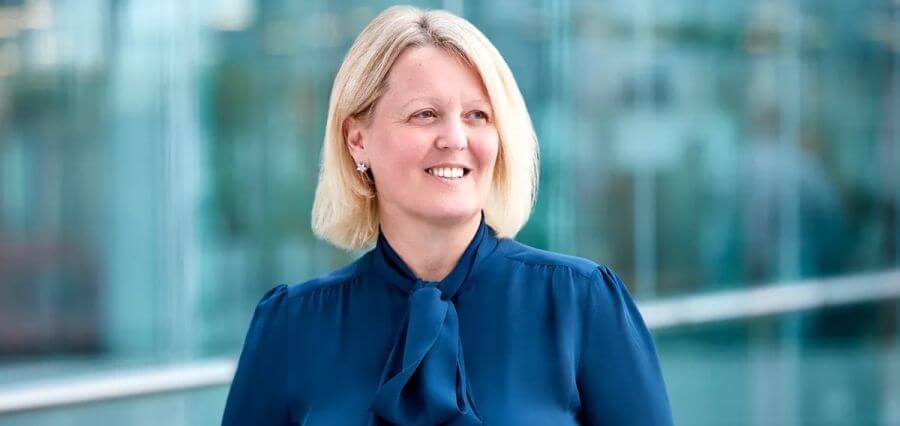Dame Alison Rose has made several appearances on high-profile programmes and podcasts, illuminating the challenges and successes of being the first woman to lead a major British bank. As the former CEO of NatWest Group, she has many leadership stories to share — plus countless insights into the inner world of banking.
One of the programmes that Alison has featured on is the talk show Leaders with Lacqua. This show is so popular that host Francine Lacqua has interviewed prominent individuals for six seasons.
Alison featured on the programme in 2022, discussing why so few women access venture capital and how the pandemic left them taking on a high proportion of family-care responsibilities.
On the show, she also dives into the evolving relationship between banks and customers, the rising incidences of crypto-related fraud, and how we can measure success in the banking industry.
Why Women Aren’t Accessing Venture Capital Funding
During her interview, Alison tells viewers, “a very shockingly small amount of venture capital money goes to female entrepreneurs.” She explains there are several reasons for this, including a lack of awareness around venture capital (VC) for women in business.
Although the amount of VC that female founders secure has climbed from 1% to 5%, this is “still shocking,” Alison says. The percentage is this low for many reasons but there is a disparity that many “investment teams are all male… They’d say they’re not seeing the pipeline, but we [at NatWest] saw amazing female entrepreneurs,” she explains.
Despite the fact that so few women are getting access to this funding, Alison has seen firsthand that there are numerous high-level female entrepreneurs in the UK.
She has worked hard to address women’s barriers to VC and has since “seen a real increase in female entrepreneurs.” In 2021, the number of businesses that women opened and ran increased by 33%. That’s “156,000 new businesses opened by women,” Alison says.
“Really excitingly, the biggest growth was in the 16-to-24-year-old age group. But it’s still too hard because it’s geared to perceptions of what a business leader should be, what an entrepreneur needs to be successful, and yet you have this amazing group of female entrepreneurs. So it’s moving but not fast enough,” she explains.
How Working From Home During Covid-19 Hindered Women
Also on the topic of female founders, Alison spotlights the career challenges that women in business faced during the pandemic. She found that, in the short term, remote working was a hindrance to many women.
“One of the big barriers to female entrepreneurs is that family-care responsibilities disproportionately fall on their shoulders,” Alison says. “During the pandemic, with working from home, that became exacerbated.”
Referring to her own situation, she recalls running NatWest from her home office with both of her children off school and at home. “My daughter was going through her A levels. My son was doing online learning,” she says. “So it was definitely a challenge. My husband was brilliant, we shared it. But it is a different dimension of stress that you feel.”
Looking at the wider picture, Alison’s research at the time revealed that “70% of female entrepreneurs found running their business in the pandemic more stressful than men.” Only 55% of men felt the same level of stress. “For women, they had to take 6 out of 10 days for caring responsibilities,” Alison explains. Meanwhile, on average, men took 1 out of 10.
“However, the fact that networking could be delivered digitally online — and it wasn’t in a very old, traditional way — the fact that you could bring teams together and work remotely was definitely an advantage,” she adds.
Then, as the UK eased out of the pandemic, digital and technological resources and events led to a “big increase and more direct practical help for female entrepreneurs.” Many are now flourishing in their ventures as a result.
The Modern Relationship Between Customers and Banks
During the interview, Alison also explores the massive changes that banking has seen over the past couple of decades. In particular, many more people now manage their transactions via apps rather than in branches. As so many people no longer need to speak to someone about their banking, the relationship between customers and banks has shifted.
To put this into perspective, Alison explains that in 2022, 60% of NatWest’s retail customers only dealt with the bank digitally. “90% of their transactions can be done digitally and online,” she says.
This is a “sign of how technology is evolving, how customer behaviour is evolving.” It’s “much more interactive” and “much more convenient, and that’s what banking should be.”
Because of this, Alison’s strategy at NatWest was to create “a relationship bank for a digital world.” She explains that there should always be a relationship between a bank and its customers, but it “can be delivered in a very different way” to previous models.
“You can’t rely on customers to come to you,” she says. They could be “in the metaverse,” “on TikTok,” or “somewhere else. So we’ve got to build the relationship and go where they are.”
“The boundaries between the virtual world and the real world are very different. A lot of younger customers move very effortlessly between different places. So we need to make sure we stay relevant.”
Measuring Success in Banking
Given the evolving nature of banking, NatWest measures success in various ways, including by meeting the needs of customers through their life cycles. In 2022, the bank had grown its market share with youth customers up to almost 16%.
However, Alison believes the real test will be in 20 years time, when these young people will hopefully still be customers of the bank. NatWest will be “helping them with their house,” “helping them invest for the future,” and “doing all the things that really matter,” she says.
Measuring success is critical when a bank has a purpose strategy to “build long-term value so customers stay with [them] and grow with [them],” Alison says.
Changes Alison Rose Expects to See in the Banking Sector
The banking sector has already evolved significantly but will change again. Over the next few years, Alison expects technology and data to continue “transforming not just how customers work, but how [banks] work.”
As this evolution unfolds, she believes forging strategic partnerships will be essential to the strategies of those in banking leadership. “I think partnership, technology, and data are all going to be part of it,” she says. Banks are “an intrinsic part of people’s lives, and that’s a very privileged place to be. We just need to make sure we stay there.”
“Banks have no reason to exist unless our customers want us to exist. We provide capital and fuel to the economy, but we need to make sure we’re serving them and working with them.”
The Rise of Crypto-Related Fraud
Another shift to look out for in banking is the continuing rise of crypto-related fraud. Alison considers crypto “a real challenge.” During her tenure at NatWest, she saw “very significant amounts of fraud coming through that channel.”
“People are being defrauded constantly,” she says. In 2021, NatWest stopped over 355 million fraud attempts against customers. These attempts included online, romance, and impersonation scandals. “Making sure we can protect customers and inform and educate them is really important,” Alison emphasises.
Leadership and Banking Insights From Alison Rose
As NatWest Group’s CEO, Dame Alison led the organisation through all kinds of initiatives and challenges. She explores many of these on Leaders with Lacqua, from rebuilding banking’s damaged reputation to supporting customers through inflation-related difficulties and Covid-19.
Moving forward, her goal is to continue helping “people, families, and businesses navigate uncertainty ahead.”
Watch Alison Rose’s interview on Leaders with Lacqua.
About Alison Rose
Alison Rose has made history as the first woman to lead a major British bank. In her role at Natwest Group, she opened new pathways for women to access resources and opportunities to scale their entrepreneurial ventures. In recognition of her pioneering contributions to the banking sector, she was named Dame Commander of the Order of the British Empire in 2023.














